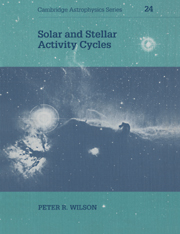Book contents
- Frontmatter
- Contents
- Preface
- Acknowledgments
- 1 Introduction
- 2 Historical survey
- 3 The structure of the Sun and the phenomena of activity
- 4 The equations of magnetohydrodynamics and magnetohydrostatics
- 5 The one-dimensional configuration of the cycle
- 6 Heuristic models of the solar activity cycle
- 7 Stellar activity and activity cycles
- 8 The two-dimensional representation of the extended activity cycle
- 9 The origin of the large-scale fields
- 10 The reversal of the polar magnetic fields
- 11 The role of dynamo theory in cyclic activity
- 12 Helioseismology and the solar cycle
- 13 Cyclic activity and chaos
- 14 Forecasting the solar cycle
- 15 Summary and conclusions
- Author index
- Subject index
Preface
Published online by Cambridge University Press: 27 October 2009
- Frontmatter
- Contents
- Preface
- Acknowledgments
- 1 Introduction
- 2 Historical survey
- 3 The structure of the Sun and the phenomena of activity
- 4 The equations of magnetohydrodynamics and magnetohydrostatics
- 5 The one-dimensional configuration of the cycle
- 6 Heuristic models of the solar activity cycle
- 7 Stellar activity and activity cycles
- 8 The two-dimensional representation of the extended activity cycle
- 9 The origin of the large-scale fields
- 10 The reversal of the polar magnetic fields
- 11 The role of dynamo theory in cyclic activity
- 12 Helioseismology and the solar cycle
- 13 Cyclic activity and chaos
- 14 Forecasting the solar cycle
- 15 Summary and conclusions
- Author index
- Subject index
Summary
What seems unimaginable in the future becomes inevitable in the past.
Anon.In February of 1985, an international group of solar astronomers, including both observers and theoreticians, met in Tucson, Arizona, and agreed to plan a series of workshops with the aim of mounting a coordinated study of the new solar cycle, Cycle 22, which was expected to begin in 1986. Meetings were hosted by the California Institute of Technology at the Big Bear Solar Observatory in August of 1986, by Stanford University at Fallen Leaf Lake in May 1987, by the University of Sydney in Sydney, Australia, in January 1989, and by the National Solar Observatory in Sunspot, New Mexico, in October 1991.
This volume does not seek to provide a formal account of the workshop proceedings, which may be found elsewhere. It has, however, been inspired by the intellectual stimulation generated by these meetings and by the many contacts with scientists throughout the world which have followed them.
While making full acknowledgment to the many people whose work and ideas have provided me with excitement and stimulation, I do not wish to imply that this book represents a general consensus. It is not possible to provide a definitive account of the mechanisms underlying cyclic activity at the present time; opinions differ strongly on some aspects, whereas a general bafflement prevails in other areas. It is thus an exciting field, and this volume is intended to set forth a summary of the current state of our understanding of stellar cycles, as interpreted by the author.
- Type
- Chapter
- Information
- Solar and Stellar Activity Cycles , pp. xv - xviPublisher: Cambridge University PressPrint publication year: 1994

